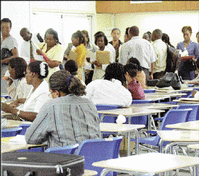By David Williams,
Freelance Writer

Some of the 200 teachers who turned up yesterday at the University of the West Indies, Mona, to apply for jobs in the New York City public school system. Interviews with some 400 more applicants are scheduled for today and tomorrow. Successful applicants will take up their jobs in August. - Dennis Coke
MORE THAN 600 Jamaican teachers are to start working in the New York City public school system in August.
They are being hired at a three-day recruitment drive at the UWI, Mona, being undertaken by the Centre for Recruitment and Professional Development of New York City Public Schools. It ends tomorrow.
Close to 200 primary and high-school teachers from various parishes and with varying levels of experience turned up to complete applications and for interviews when the massive recruitment of teachers opened at the Mona Campus yesterday.
Recent graduates of the island's teachers' colleges as well as senior teachers with 20-plus years of experience were among those lining up for the 640 jobs in New York schools for two years, beginning in August 2001.
Caryl Cohen, director of recruitment at the Centre for Recruitment and Professional Development, said the local teacher-hunt is part of an international drive to recruit personnel to meet an urgent need for 12,000 teachers in the US. She said the US school system is experiencing growth in student intake while a large number of teachers are reaching retirement age.
"This year in particular, we have an increased need because we have a large number of 'baby boomers' who have become eligible for retirement. If they retire, that leaves more of a void," she told The Gleaner.
She said there was a "critical" need for persons trained in Elementary Education, Special Education, Reading, Mathematics, Spanish, the Sciences, and English as a second language to be deployed in several New York school districts. She said the schools typically have below- average students, a high percentage of whom are of Jamaican background.
"This will be a unique opportunity for both the Jamaican teachers and the students," Mrs. Cohen said.
The team conducted recruitment in Barbados and Trinidad and Tobago last month, where, according to officials, the number of applications was quite high.
"We've seen quite a few people with 25 years of experience coming today, as we did in Barbados and Trinidad," Mrs. Cohen observed. She noted that the number of applications in Jamaica has exceeded those for Barbados and Trinidad, but the qualification levels of applicants was generally the same across the three islands. Similar recruitment drives have been carried out in Austria, Spain, Italy, the Philippines, Australia, New Zealand, several Canadian provinces, and within the United States.
Applicants are required to have a degree or diploma in Education, a minimum of five years' teaching experience, and a clean police record. In addition to their regular salary, which will be based on the level of qualification and experience, successful candidates will receive a tax-free incentive of US$3,400 per year.
"We're offering the candidates who are selected with matching credentials for a vacancy that exists and a 'commitment letter' which is tantamount to being hired on the spot," said Brenda Steele, one of the recruiters.
On arrival in the United States in August, the selected teachers will undergo general pre-service training, as well as training courses specially designed for international recruits. They will start teaching when the academic year begins in September, and will be required to do course work with various colleges during the two-year stint.
One teacher who travelled from Portland to be interviewed, said she was tired of working in overcrowded classrooms and having to teach using limited resources. The UWI graduate, who requested anonymity, said she welcomed the opportunity to further her studies and gain additional experience, while getting higher pay. She admitted that she had no details of the conditions she would be expected to work under.
"A teacher with a diploma doesn't even take home $25,000 per month here. That is bad, bad, bad," she lamented. "The money is my main reason for wanting to go."
A senior teacher of 20 years' experience, who also asked not to be named, said she applied because of a need "to get a different kind of experience"... I need to interact with a different type of child. I need to see how another school system operates," she told The Gleaner.
The Kingston-based teacher said she hoped to open up educational opportunities for her teenage son while working in the USA.
"I have my son to think about. If he was small I wouldn't go. But he's just finishing CXC and I won't have the heart to tell him when his time comes to get into a tertiary institution that I don't have the money to send him, because of patriotism," the teacher said.







































































